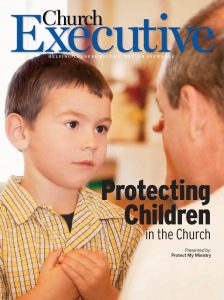
By Patricia Carlson
There are many hurdles when trying to land a job. Passing a background check shouldn’t be one of them.
![]() Background checks are often the final litmus test before receiving a job offer. They are — rightly so — an increasingly common requirement in churches’ hiring procedures and vetting policies for volunteers. A thorough background investigation conducted by a nationally accredited screening agency can deliver information on a person’s criminal record, credit history, drug test record, education verification and reference checks. Many ministry background checks also mandate a candidate pass a child safety training course.
Background checks are often the final litmus test before receiving a job offer. They are — rightly so — an increasingly common requirement in churches’ hiring procedures and vetting policies for volunteers. A thorough background investigation conducted by a nationally accredited screening agency can deliver information on a person’s criminal record, credit history, drug test record, education verification and reference checks. Many ministry background checks also mandate a candidate pass a child safety training course.
There is no such thing as perfect
 It’s unlawful to run a background check on a candidate without his or her consent. It’s also totally normal to have some reservations about agreeing to a background investigation. With so many misconceptions about background checks (see our article — Background check myths: Debunking the 4 most dangerous misconceptions — in the September / October 2015 issue of Church Executive), it’s hard to know what information is being gathered about you, how it’s being assessed, and why it can affect your employability.
It’s unlawful to run a background check on a candidate without his or her consent. It’s also totally normal to have some reservations about agreeing to a background investigation. With so many misconceptions about background checks (see our article — Background check myths: Debunking the 4 most dangerous misconceptions — in the September / October 2015 issue of Church Executive), it’s hard to know what information is being gathered about you, how it’s being assessed, and why it can affect your employability.
Ministries need to be aware that even the best applicant on paper might not seem so squeaky clean after a background check. It’s important that church leaders have a standardized policy when it comes to identifying “red flags” that will disqualify someone from employment or volunteer positions. Even red flags such as behavior or character traits need to be thoughtfully weighed as they could expose the church to increased risk.
4 common red flags
Having completed millions of background checks for ministries, our team can pinpoint several common red flags that might eliminate candidates from consideration. Here are four of the more common ones, and what they could indicate for your religious organization.
#1: A violent criminal record. Any candidate with convictions for crimes against a person — especially a sex crime — isn’t someone you would want working with or near children.
Ministries should also be wary of individuals with convictions for child abuse or who have had a court order to remove children from their home issued against them.
Drug-related convictions also warrant additional vetting; it might be in the church’s best interest to partner that person with a clergy member or counselor for a discipleship program.
#2: Fraud or theft convictions. Applicants with financial crimes — bankruptcies, thefts and identity theft — on their records should not be considered for any position that handles church money. Even something as simple as receiving the offering can leave the church exposed. Find another job opportunity or volunteer position for this person.
#3: A criminal conviction that occurred more than 10 years ago. These results often turn up in court records searches. Before allowing an individual to serve your church, it’s important to consider how much time has passed since the crime(s) occurred, as well as current character references, steady employment, and whether or not the person has permanent housing.
#4: Poor credit history. Credit history might not be of utmost concern for most jobs within a ministry; but, if you’re considering an applicant for any sort of financial or security position, it’s something you might want cleared up before green-lighting an offer.

Keep in mind, however, that several states have enacted laws on the use and restrictions on using credit reports for employment purposes. Remember to check with your background check provider on what’s allowed.
Best practices
Implementing background checks is one thing. Knowing what to do with the results is another.
If your church doesn’t already have an established policy in place that defines what red flags will disqualify an applicant, then it’s in your best interest to treat everyone the same. That means that if a candidate for employment — or for a volunteer position — can’t pass a background check, he or she should only serve in limited roles.
Although strict, this approach makes the most sense. It protects the people of your congregation and demonstrates smart stewardship by church leaders.
Patricia Carlson is a Florida-based freelance writer for Protect My Ministry in Tampa, FL.


